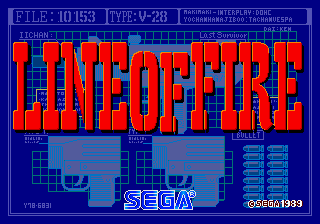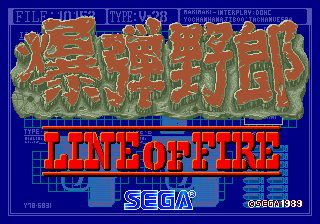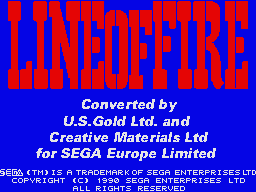Line of Fire
From Sega Retro
- For the redesigned Sega Master System port, see Line of Fire (Master System).
| ||||||||||||||||||||||||||||||||||||||||||||||||||||||||||||||
| Line of Fire | ||||||||||||||||||||||||||||||||||||||||||||||||||||||||||||||
|---|---|---|---|---|---|---|---|---|---|---|---|---|---|---|---|---|---|---|---|---|---|---|---|---|---|---|---|---|---|---|---|---|---|---|---|---|---|---|---|---|---|---|---|---|---|---|---|---|---|---|---|---|---|---|---|---|---|---|---|---|---|---|
| System(s): Sega X Board, Amiga, Amstrad CPC, Atari ST, Commodore 64, ZX Spectrum | ||||||||||||||||||||||||||||||||||||||||||||||||||||||||||||||
| Publisher: Sega Enterprises, Ltd. U.S. Gold | ||||||||||||||||||||||||||||||||||||||||||||||||||||||||||||||
| Developer: Sega R&D 1 Creative Materials Tiertex | ||||||||||||||||||||||||||||||||||||||||||||||||||||||||||||||
| Genre: Shoot-'em-Up | ||||||||||||||||||||||||||||||||||||||||||||||||||||||||||||||
| Number of players: 1-2 | ||||||||||||||||||||||||||||||||||||||||||||||||||||||||||||||
|
This short article is in need of work. You can help Sega Retro by adding to it.
Line of Fire (ライン・オブ・ファイヤー), known in Japan as Line of Fire: Bakudan Yarou (ライン・オブ・ファイヤー 爆弾野郎), is a Sega X Board arcade light gun game developed by Sega R&D 1 and manufactured by Sega Enterprises, Ltd. First released to Japanese and American arcades in December 1989[1], the game notably uses sprite scaling to simulate three-dimensional scenery, and saw contemporary ports to a number of personal computers.
One year later, Line of Fire was significantly redesigned and ported to the Sega Master System as the titular Line of Fire.
Contents
Gameplay
Missions
| Mission 1 | |
|---|---|
| Capture the powerful machine gun unit from the enemy base! | |
| Mission 2 | |
| Destroy the enemy jungle base. | |
| Mission 3 | |
| Escape by high-speed boat. | |
| Mission 4 | |
| Fighting in the canyon. | |
| Mission 5 | |
| Do or die battle in the desert. | |
| Mission 6 | |
| Foes await in the city's ruins. | |
| Mission 7 | |
| Escape the enemies by aircraft. | |
| Mission 8 | |
| Fly to your base by helicopter. |
Story
In the game, you play as two escaping POWs who were captured after seizing a "secret machine gun unit" from the enemy.
Versions
Unlike most other Sega arcade conversions of the time, the Amiga and Atari ST versions feature some degree of software-based sprite scaling, although sprite limits meant this could not be implemented for the background of the first stage[5]. To compensate, the number of on-screen enemies is reduced over the arcade, and several enemy types had to be removed entirely[5].
The plan had originally been to use Vidi-ST to screenshot (or "digitise") graphics from the arcade board in monochrome, which would then be edited and coloured by hand, but this proved too slow. The team then purchased a different digitising solution - the Coloupic by JCL, but this was incompatible with the arcade machine's NTSC output[6]. JCL offered to resolve it, but while the backgrounds came out okay, sprites did not[6]. The team eventually built a custom Amiga expansion board that could interface with the arcade ROMs, converted Sega's graphics into Amiga IFF files, and edited through PIXmate[6].
History
Legacy
Line of Fire did not receive a sequel, but was loosely followed up by Laser Ghost the following year, which pays tribute to its predecessor on the title screen with a tombstone marked 1988-1990 Line of Fire[7].
Production credits
- Main article: Line of Fire/Production credits.
Magazine articles
- Main article: Line of Fire/Magazine articles.
Promotional material
- Main article: Line of Fire/Promotional material.
Physical scans
Arcade version
| Sega Retro Average | |||||||||
|---|---|---|---|---|---|---|---|---|---|
|
| 66 | |
|---|---|
| Based on 1 review | |
| X Board, JP | ||||
|---|---|---|---|---|
Amiga version
| Sega Retro Average | ||||||||||||||||||||||||||||||||||||||||||||||||||||||
|---|---|---|---|---|---|---|---|---|---|---|---|---|---|---|---|---|---|---|---|---|---|---|---|---|---|---|---|---|---|---|---|---|---|---|---|---|---|---|---|---|---|---|---|---|---|---|---|---|---|---|---|---|---|---|
|
| 67 | |
|---|---|
| Based on 10 reviews | |
Amstrad CPC version
| Sega Retro Average | ||||||||||||||
|---|---|---|---|---|---|---|---|---|---|---|---|---|---|---|
|
| 49 | |
|---|---|
| Based on 2 reviews | |
| Amstrad CPC, UK (cassette) |
|---|
|
| Amstrad CPC, UK (disk) |
|---|
|
| Amstrad CPC, ES (cassette) |
|---|
|
| Amstrad CPC, ES (disk) |
|---|
|
Atari ST version
| Sega Retro Average | |||||||||||||||||||
|---|---|---|---|---|---|---|---|---|---|---|---|---|---|---|---|---|---|---|---|
|
| 48 | |
|---|---|
| Based on 3 reviews | |
| Atari ST, UK |
|---|
|
Commodore 64 version
| Sega Retro Average | |||||||||||||||||||||||||||||
|---|---|---|---|---|---|---|---|---|---|---|---|---|---|---|---|---|---|---|---|---|---|---|---|---|---|---|---|---|---|
|
| 34 | |
|---|---|
| Based on 5 reviews | |
| Commodore 64, UK |
|---|
|
ZX Spectrum version
| Sega Retro Average | |||||||||||||||||||||||||||||
|---|---|---|---|---|---|---|---|---|---|---|---|---|---|---|---|---|---|---|---|---|---|---|---|---|---|---|---|---|---|
|
| 74 | |
|---|---|
| Based on 5 reviews | |
| ZX Spectrum, ES |
|---|
|
Specifications
Dimensions
| Sit-Down | Upright |
|---|---|
|
|
|
| Mass: 230 kg (506 lbs) | Mass: 150 kg (330 lbs) |
References
- ↑ 1.0 1.1 Sega Arcade History, Enterbrain, page 101
- ↑ https://archive.org/details/ArcadeGameList1971-2005/page/n132/mode/1up
- ↑ 3.0 3.1 ACE, "January 1991" (UK; 1990-12-xx), page 55
- ↑ 4.0 4.1 4.2 4.3 4.4 4.5 4.6 4.7 Computer & Video Games, "December 1990" (UK; 1990-11-16), page 167
- ↑ 5.0 5.1 Zero, "December 1990" (UK; 1990-1x-xx), page 19
- ↑ 6.0 6.1 6.2 Zero, "December 1990" (UK; 1990-1x-xx), page 22
- ↑ File:LaserGhost System18 Title.png
- ↑ Commodore User, "February 1990" (UK; 1990-01-26), page 89
- ↑ ACE, "February 1991" (UK; 1991-01-08), page 60
- ↑ 10.0 10.1 Aktueller Software Markt, "März 1991" (DE; 1991-02-22), page 59
- ↑ CU Amiga, "January 1991" (UK; 1990-12-xx), page 56
- ↑ 12.0 12.1 Computer & Video Games, "January 1991" (UK; 1990-12-15), page 74
- ↑ The Games Machine, "Febbraio 1991" (IT; 1991-xx-xx), page 42
- ↑ 14.0 14.1 Joystick, "Janvier 1991" (FR; 199x-xx-xx), page 200
- ↑ Power Play, "3/91" (DE; 1991-02-15), page 120
- ↑ Raze, "March 1991" (UK; 1991-01-31), page 52
- ↑ Tilt, "Février 1991" (FR; 1991-0x-xx), page 79
- ↑ 18.0 18.1 Zzap!64, "March 1991" (UK; 1991-xx-xx), page 69
- ↑ 19.0 19.1 Zzap!, "Marzo 1991" (IT; 1991-xx-xx), page 16
- ↑ ST Action, "February 1991" (UK; 1991-01-xx), page 82
- ↑ ST Format, "February 1991" (UK; 1991-01-10), page 90
- ↑ Commodore Format, "March 1991" (UK; 1991-02-21), page 42
- ↑ Power Play, "4/91" (DE; 1991-03-15), page 119
- ↑ Your Commodore, "March 1991" (UK; 1991-02-22), page 24
- ↑ Crash, "January 1991" (UK; 1990-12-13), page 63
- ↑ Svet Kompjutera, "Jun 1991" (YU; 1991-xx-xx), page 75
- ↑ Sinclair User, "January 1991" (UK; 1990-12-18), page 52
- ↑ Your Sinclair, "January 1991" (UK; 1990-12-06), page 25
- ↑ 29.0 29.1 File:LineofFire Arcade JP Flyer.pdf
| Line of Fire | |
|---|---|
|
Main page | Comparisons | Credits | Hidden content | Magazine articles | Reception | Promotional material | |
- 1-2 player games
- All arcade games
- X Board games
- 1989 X Board games
- All 1989 games
- Arcade shoot-'em-up games
- All shoot-'em-up games
- UK Amiga games
- All UK games
- Amiga games
- 1991 Amiga games
- All 1991 games
- UK Atari ST games
- Atari ST games
- 1991 Atari ST games
- ES Amstrad CPC games
- All ES games
- UK Amstrad CPC games
- Amstrad CPC games
- 1990 Amstrad CPC games
- All 1990 games
- UK Commodore 64 games
- Commodore 64 games
- 1990 Commodore 64 games
- ES ZX Spectrum games
- UK ZX Spectrum games
- ZX Spectrum games
- 1990 ZX Spectrum games
- All games
- Stubs
- Line of Fire








